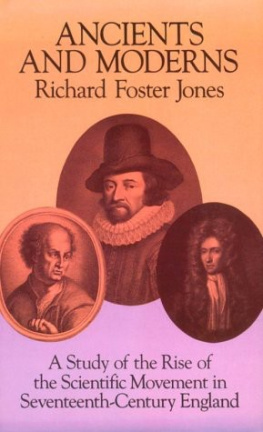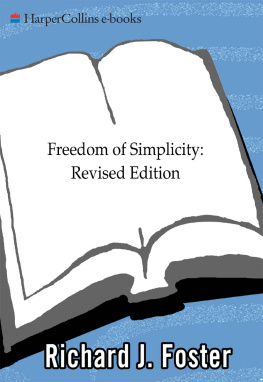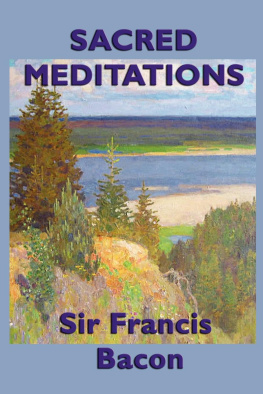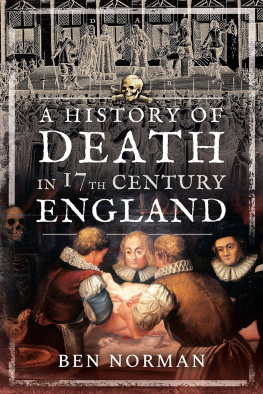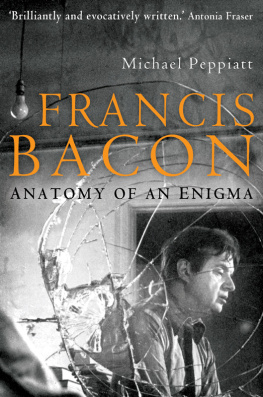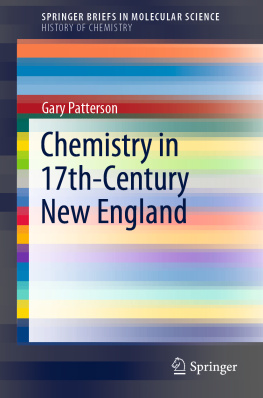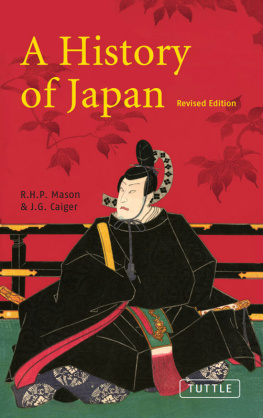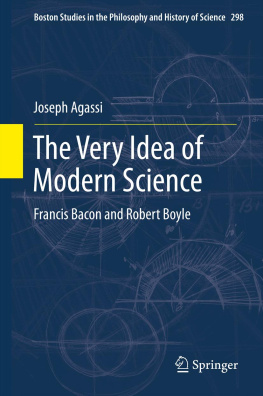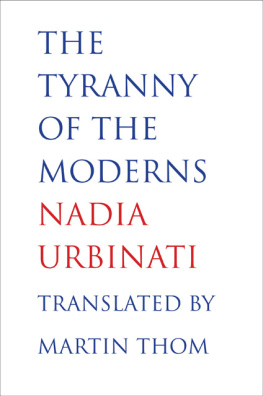Richard Foster Jones - Ancients and Moderns (Washington University Studies.)
Here you can read online Richard Foster Jones - Ancients and Moderns (Washington University Studies.) full text of the book (entire story) in english for free. Download pdf and epub, get meaning, cover and reviews about this ebook. year: 1982, publisher: Dover Publications, genre: Science. Description of the work, (preface) as well as reviews are available. Best literature library LitArk.com created for fans of good reading and offers a wide selection of genres:
Romance novel
Science fiction
Adventure
Detective
Science
History
Home and family
Prose
Art
Politics
Computer
Non-fiction
Religion
Business
Children
Humor
Choose a favorite category and find really read worthwhile books. Enjoy immersion in the world of imagination, feel the emotions of the characters or learn something new for yourself, make an fascinating discovery.
- Book:Ancients and Moderns (Washington University Studies.)
- Author:
- Publisher:Dover Publications
- Genre:
- Year:1982
- Rating:4 / 5
- Favourites:Add to favourites
- Your mark:
- 80
- 1
- 2
- 3
- 4
- 5
Ancients and Moderns (Washington University Studies.): summary, description and annotation
We offer to read an annotation, description, summary or preface (depends on what the author of the book "Ancients and Moderns (Washington University Studies.)" wrote himself). If you haven't found the necessary information about the book — write in the comments, we will try to find it.
Ancients and Moderns (Washington University Studies.) — read online for free the complete book (whole text) full work
Below is the text of the book, divided by pages. System saving the place of the last page read, allows you to conveniently read the book "Ancients and Moderns (Washington University Studies.)" online for free, without having to search again every time where you left off. Put a bookmark, and you can go to the page where you finished reading at any time.
Font size:
Interval:
Bookmark:
A Study of the Rise of the Scientific Movement in Seventeenth-Century England
BY RICHARD FOSTER JONES Professor Emeritus of English, Stanford University Sometime Professor of English, Washington University
SECOND EDITION WITH AN INDEX, NEW PREFACE, AND MINOR REVISIONS
WASHINGTON UNIVERSITY STUDIES ST. LOUIS 1961
-iii-
COPYRIGHT 1961 BY THE COMMITTEE ON PUBLICATIONS WASHINGTON UNIVERSITY ST. LOUIS
SECOND EDITION
-iv-
TO THE ENGLISH DEPARTMENT OF STANFORD UNIVERSITY THIS BOOK IS DEDICATED
-v-
|
No exaggerated estimate of the value of this book is responsible for its second appearance. First published in a limited number of copies in 1936, it has been out of print for some years, and requests for copies have prompted Washington University to ask the author to prepare a second edition. Originally the work was the outgrowth of a previous study of the controversy between the upholders of antiquity and those of modernity in the seventeenth century, evidence of which fact is seen in its first title and subtitle. Since the book is now rather closely identified with that title, it has seemed best to retain it, but the subtitle, together with certain passages in the text, has been changed to conform more closely to the nature of the study, the scope of which in the process of its first composition expanded, almost unconsciously, to include more elements in the scientific movement than were indicated on the title page. The first preface and conclusion recognized this condition and attempted to reconcile book and title, but with less than complete satisfaction. For this reason a more truly descriptive subtitle seemed desirable. Much has been done in the history of science in the seventeenth century since the book was first composed, and it is, perhaps, to be regretted that the present edition does not, with rare exceptions, take note of material that may bear upon it. Since, however, these additions to knowledge lie rather near the periphery of the present author's conception of the scientific movement in the way of amplifying and clarifying matters subservient to it, and since, as far as he knows, his general ideas have not been attacked, he has left the text almost entirely in its original form.
The subject of this book is that thought movement in the seventeenth century to which modern science in England traces its source. Therefore, the author is interested more in what scientists and fellow travellers say than in what they do, more in the complex of thought and feeling out of which scientific achievement sprang than in the achievements, more in the attitude expressed toward discoveries than in the discoveries themselves. This movement was thoroughly, though not exclusively, Baconian. The present study strives to be objectively historical, but if a thesis can be discovered in it, it is that Sir Francis Bacon
-vii-
bears the same relationship, to the movement under discussion as, for example, Karl Marx bears to the development of Communism, but, of course, to much better purpose. It is that type of relationship in which a leader becomes the human center of a movement, to whom men can feel and pay loyal allegiance in the spirit of discipleship. The encouragement and stimulation derived from this attitude is by no means a negligible factor in the development of science during the mid-seventeenth century, though obscured by more tangible evidences of Bacon's influence.
Sir Francis both expressed and molded his age. Before his scientific writings appeared, not only had significant discoveries been made, but also important elements of the movement itself had taken form, such as hostility to the authority of the ancients, and the importance of experiments, yet in England it was indeed moving slowly until he rang his bell, and as the century advances it assumes more and more a Baconian complexion. Some of the most influential ideas in the current of scientific thought are too uniquely his to render any other source credible. An outstanding example is his idea of the necessity of an universal natural history drawn from authentic records of the past as well as from contemporary observations and experiments, one wide enough indeed to cover all nature. Upon this material his inductive method was to be employed for the purpose of discovering the fundamental laws of nature, knowledge of which would enable men to use them, singly or in combination, to secure all the effects of which nature is capable. Bacon cheerily announced that this happy event would follow soon after the ages required for the compilation of his history. The unquestioning acceptance of this impossible idea by the best scientific thinkers of the day may be termed one of the marvels of history, which only Bacon was capable of bringing about. He inspired in his followers such complete confidence in his ideas that they were stimulated and incited to carry on experiments with an intensity hitherto unknown, so much so, in fact, that Sprat was moved to call his times "this age of experiments." It is hardly an exaggeration to say that the compilation of this history was the conscious goal of most of the scientific activities of the day.
Another unique element is the emphasis which Bacon placed upon experimentation, for the latter, though by no means new, had never been accorded the absolute authority and exclusive role
-viii-
upon which he insisted. This attitude is to be associated with his attack on the authority of antiquity, to which men had for ages largely turned for knowledge of nature. In experiments he had an alternative to offer men whom he would turn from the ancients, and whom he thus brought to nature herself. He and the age he influenced never tired of contrasting the two sources of information, as the antitheses which the contrast suggested testify: nature versus books, works versus words, laboratories versus libraries and closets, industry versus idleness. At times it seems as if men were charmed by the magic word "experiment" itself, and it must be confessed that in general no great progress was made in penetrating deeply into the true nature of experimentation. A few like Boyle and Hooke, it is true, were inquiring into the characteristic of truly scientific experiments and the proper method of making them, but some let the word rather than the proper conception serve their purpose. Even the physical exertion required by experimental research assumes an aspect of virtue, and the physical inactivity of reading becomes nothing more than sloth. Sometimes the contrast comes perilously near that between doing and thinking. The science of the day was most frequently called "the experimental philosophy," though other adjectives, "new," "free," "solid," "useful," "real," find expression. And finally faith in experimentation influenced the Baconians in their attitudes toward other types of science. It softened their criticism of the bragging chemists, and rendered suspect, to a certain extent, the mechanical philosophy of matter, motion, and mathematics, which under the influence of Descartes and the atomic philosophers was slowly establishing science on the firmest foundation it had ever possessed, but which at the time was criticized as being a theory only and not based on a sufficient number of experiments.
There was one other characteristic of seventeenth-century science for which Bacon was largely, if not entirely, responsible, namely, its pronounced utilitarianism. The purpose of his Magna Instauratio was to enable man to know nature in order to command her. It is true, Bacon divides experiments into two groups, those that give light and those that bear fruit, but the purpose of the first was to enlarge man's knowledge so that he might thereby enjoy more fruit. Bacon feared that in observing and experimenting, men would gain bits of knowledge which they could im
Font size:
Interval:
Bookmark:
Similar books «Ancients and Moderns (Washington University Studies.)»
Look at similar books to Ancients and Moderns (Washington University Studies.). We have selected literature similar in name and meaning in the hope of providing readers with more options to find new, interesting, not yet read works.
Discussion, reviews of the book Ancients and Moderns (Washington University Studies.) and just readers' own opinions. Leave your comments, write what you think about the work, its meaning or the main characters. Specify what exactly you liked and what you didn't like, and why you think so.

